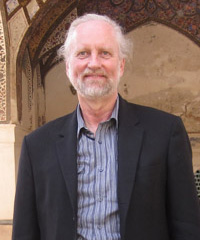
Edward Wierenga
Emeritus Professor of Philosophy
Emeritus Professor of Religion and Classics
PhD, University of Massachusetts, 1974
- Office Location
- 427 Rush Rhees Library
Office Hours: by appointment
Research Overview
Research Interests
- Philosophy of Religion
- Metaphysics
Selected Publications
Selected Books
- The Philosophy of Religion (Wiley-Blackwell, 2016)
- The Nature of God: An Inquiry into Divine Attributes (Cornell University Press, 1989); paper (Cornell University Press, 2003); Italian translation, La Natura di Dio: Un’indagine sugli attributi divini (Perugia: Graphe.it Edizioni, 2006)
Selected Papers
- “Middle Knowledge and Evil,” in The History of Evil from the Mid-20th Century to Today (1950-2010), Yehuda Gellman, ed., Vol. VI of The History of Evil, Chad Meister and Charles Taliaferro, eds. (London: Acumen, forthcoming).
- “The Ontological Argument and Objects of Thought,” The Annual Proceedings of the Center for Philosophic Exchange (2011-12): 83-97.
- “Tilting at Molinism,” in Ken Perszyk, ed., Molinism: The Contemporary Debate (Oxford: Oxford University Press, 2011): 118-139.
- “Augustinian Perfect Being Theology and the God of Abraham, Isaac, and Jacob,” International Journal for Philosophy of Religion 69 (2011): 139-151.
- “Omniscience”, The Stanford Encyclopedia of Philosophy (Spring 2010 Edition), Edward N. Zalta (ed.), URL = <http://plato.stanford.edu/archives/spr2010/entries/omniscience/>.
- “Omniscience,” Oxford Handbook of Philosophical Theology, Thomas Flint and Michael Rea, eds. (Oxford: Oxford University Press, 2009): 129-144.
- “Perfect Goodness and Divine Freedom,” Philosophical Books 48 (2007): 207B216.
- “Omnipresence,” The Routledge Companion to Philosophy of Religion, Paul Copan and Chad Meister, eds. (London and New York: Routledge, 2007).
- “Trinity and Polytheism,” Faith and Philosophy 21 (2004): 281-294.
- “Omniscience and Time, One More Time: A Reply to Craig,” Faith and Philosophy 21 (2004): 90-97.
- “The Freedom of God,” Faith and Philosophy 19 (2002): 425-436.
- “Providence, Middle Knowledge, and the Grounding Objection,”Philosophia Christi 3 (2001): 447-457.
- “Timelessness out of Mind: On the Alleged Incoherence of Divine Timelessness,” Greg Ganssle and David Woodruff, eds., God and Time(Oxford: Oxford University Press, 2001): 153-164.
- “The No Grounds Objection,” in William Hasker, David Basinger, and Eef Dekker, eds., Middle Knowledge: Theory and Applications (Frankfurt am Main: Peter Lang, 2000): 58-65.
- “Theism and Counterpossibles,” Philosophical Studies 89 (1998): 87-103.
- “Omnipresence,” in Philip L. Quinn and Charles Taliaferro, eds., A Companion to the Philosophy of Religion (Oxford: Blackwell, 1996), 286-290; revised in Charles Taliaferro, Paul Draper, and Philip L. Quinn, eds.,A Companion to the Philosophy of Religion (second edition) (Oxford: Blackwell, 2010): 258-262.
- “Philosophy of Religion in the Twentieth Century,” in J. Canfield, ed.,Philosophy of the English Speaking World: Meaning, Knowledge and Value, Routledge History of Philosophy, Vol. 10 (Routledge, 1996); paperback (2003). Farsi translation published as “Falsafeh-ye din dar qarn-e bistom,” Ketab-e mah-e din, no. 33 (July 2000): 44-52.
- “Creation ex nihilo,” “Disembodiment,” “Divine Attributes,” “Divine Foreknowledge,” entries in Robert Audi, ed., The Cambridge Dictionary of Philosophy (Cambridge: Cambridge University Press, 1995). Reprinted (with revisions) as well as “Paradox of Omniscience,” in Robert Audi, ed.,The Cambridge Dictionary of Philosophy 2nd ed. (Cambridge: Cambridge University Press, 1999).
- “Omnipotence,” in Dane R. Gordon, ed., Thinking and Reading in the Philosophy of Religion (New York: Haven Publications, 1994), 212-219; reprinted from The Nature of God.
- “Prophecy, Foreknowledge, and the Necessity of the Past,” in James Tomberlin, ed., Philosophical Perspectives, 5, Philosophy of Religion (Atascadero, CA: Ridgeview Press, 1991): 425-445.
- “Omniscience and Knowledge De Se et De Praesenti,” in David Austin, ed., Philosophical Analysis: A Defense by Example (Dordrecht: D. Reidel, 1988): 251-258.
- “Anselm on Omnipresence,” The New Scholasticism 52 (1988): 30-41.
- “Utilitarianism and the Divine Command Theory,” American Philosophical Quarterly 21 (1984): 311-318.
- “Proxy Consent and Counterfactual Wishes,” Journal of Medicine and Philosophy 8 (1983): 363-375.
- “A Defensible Divine Command Theory,” Noûs 17 (1983): 387-407.
- “Omnipotence Defined,” Philosophy and Phenomenological Research 43 (1983): 363-375.
- “Identity Conditions and Events” (with Richard H. Feldman), Canadian Journal of Philosophy 11 (1981): 77-93.
- “Fodor on Davidson on Action Sentences,” Synthese 44 (1980): 347-359.
- “Thalberg on the Irreducibility of Events” (with Richard H. Feldman),Analysis 39 (1979): 11-16.
- “Intrinsic Maxima and Omnibenevolence,” International Journal for Philosophy of Religion 10 (1979): 40-49.
- “Reply to Harold Moore's 'Evidence, Evil and Religious Belief',”International Journal for Philosophy of Religion 9 (1978): 246-251.
- “Taking Someone's Word for It,” Philosophical Studies 34 (1978): 203-205.
- “Chisholm on States of Affairs,” Australasian Journal of Philosophy 54 (1976): 148-152.
- “Eliminative Materialism and Denotation: A Reply to Rosenbaum” (with Rew A. Godow, Jr.), Philosophy and Phenomenological Research 36 (1976): 398-402.
